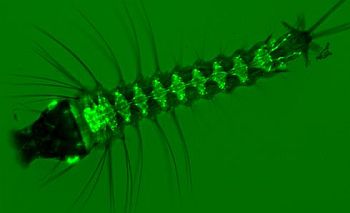Description
Material provided: Transgenic line
Unit definition: 1 mosquito transgenic line (batch of >2500 eggs)
Vector information
Family: Culicidae
Genus: Anopheles
Species: Anopheles coluzzii
Strain Name: G3 MRA-112
Place of origin: McCarthy Island, the Gambia
Date of colonisation: 1975
Genotype features (if known): 2La/+, 2r+/+, TEP1 s/s
Method of identification: Fluorescent marker (i.e. 3xP3 GFP/CFP/dsRED linked to transgene)
Maintenance cross: Inbreed/Outcross to G3
Production protocol
– Consultation on experimental design of transgenic constructs to be provided by the user for microinjection (endotoxin-free, maxiprep quality).
– Injection of up to 600 embryos, followed by rearing, crossing and screening to produce transgenic individuals by piggyBac-mediated insertion.
Alternative approach : insertion at defined attP docking site via PhiC31 integration
– Generation of at least two lines from separate integration events and molecular and genetic quality control to define insertion sites and copy numbers.
– Shipping of G2 progeny to end user : 6-9 weeks (from injection)
One free repeat offered if no transgenic individuals are recovered.
Elimination of backup transgenic lines by the provider facility : 2 months after users confirm receipt and establish line in their laboratory.
Product options
Additional lines or repeats may be available on request.
Publications
- Nolan T., et al. (2002) piggyBac-mediated germline transformation of the malaria mosquito Anopheles stephensi using the red fluorescent protein dsRED as a selectable marker. J Biol Chem 277(11):8759–8762
- Meredith JM et al. (2011) Site-specific integration and expression of an anti-malarial gene in transgenic Anopheles gambiae significantly reduces Plasmodium infections. PLoS One 6: e14587.
For more information, please contact us.

